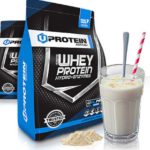Do you want to learn more about polyether polyols? They may sound like scientific jargon, but these chemical compounds are actually vital in a wide range of industries and applications. As the name suggests, these materials — also known as ether-based polyols — can be used to produce various forms of plastics, synthetic rubbers, and other types of products. This blog post will discuss all you need to know about these versatile industrial solutions so that you have the information at hand for any project!
What Are Polyether Polyols?
These compounds are polymer-based materials used in various industries to give the products strength, flexibility, and smoothness. There is a very wide use of Polytrimethylene Ether Glycol in the world and for good reason, too. These polyols are commonly used in many industrial manufacturing environments.
Polyether polyols are molecules made up of two or more linked alcohols, such as propylene or ethylene oxide. Through their unique properties, polyether polyols are formulators’ go-to ingredient when they need an oil-in-water emulsifier — or anything that helps stabilize liquids suspended within solids. These compounds’ versatility makes them integral to many products we use daily in the manufacturing industry.
Foam Production
In the modern age, foams are becoming increasingly popular for a variety of uses, from furniture cushions to packing materials. These products provide both comfort and protection, making them a great choice for many people. One of the key components used in foam production is a polyether polyol, an organic compound that is created through the polymerization of an epoxide.
Polyether polyols are used as a softener and blowing agent in the foam production process, forming lightweight, durable foam material. The addition yields a high-quality product that is both strong and resilient, offering potent protection yet also remaining comfortable. As such, these types of products are perfect for various applications anywhere from bedding to soundproofing materials.
Coating And Adhesives
Polyether polyols are commonly used in various adhesive and coating materials, due to their ability to provide strength and durability. For example, they are often used to make high-performance coatings such as flooring, furniture, automotive finishes, and metal finishes. Furthermore, these polyols can be used to improve the properties of paints like heat and water resistance.
With its durable nature and superior flexibility, this compound is an ideal choice for no-drip coatings for different substrates such as metal, wood, concrete, etc. Moreover, this type of polyol is also used in adhesives for medical applications such as transdermal patches and contact lenses. Thus, polyether polyols offer a remarkable array of properties that make them suitable for use in applications across multiple industries.
Elastomers
Elastomers are another common use for these compounds, as these materials form the basis for rubbery substances and provide an excellent option for cushioning, shock absorption, and elasticity. With polyether polyols taken as a starting point for elastomers, manufacturers are able to customize those materials to meet specific needs in terms of structures and softness levels.
This allows the items to be tailored fit for a wider range of products from clothing to automotive parts. Aside from their practical advantages, elastomers made with polyether polyols can actually also be eco-friendly because it’s possible to create biodegradable versions without compromising on performance. These make one more exciting application of this indispensable material.
Agriculture
Polyether polyols have also become increasingly popular in the agricultural industry over the past several years due to their versatility and effectiveness. They are used as an efficient component in a lot of things. Here are some common ones:
- herbicides
- fungicides
- insecticides
- fertilizer
- formulations
- tank mixtures
- adhesives
- soil conditioners
- plant growth regulators
They are also used to promote the break-up of hard soil clods, aiding in improving groundwater recharge rates and providing aeration for plant roots. Most importantly, polyether polyols can help farmers maintain soil health by acting as a natural humectant – retaining and maintaining humidity levels over extended periods – which is especially crucial for drought-resistant crop growth.
Water Treatment
These are organic compounds that are used across the water treatment industry for many purposes, including pH control and flocculation, which coagulate solids suspended in the water so they can be removed. Polyether polyols bind more strongly to most foreign substances than do their alternatives, making them great for clumping and removing unwanted impurities from water systems.
Further, because of their relatively low bioaccumulation potential and low toxicity profile, they also contribute to improved safety both during and after the water treatment process. The versatility of these chemicals makes them a frequent go-to for water purification projects across the globe!
Personal Care Products
Personal care products are increasingly being created with better environmental footprints, and polyether polyols are a big part of making that happen. Not only are they capable of creating sustainable structures in cosmetics, but they can also be used in other personal care products like shampoo, body wash, skin lotion, and deodorants.
They contain unique molecules that create the texture and durability for these products so that users can enjoy longer-lasting protection with improved safety standards. In addition to renewable and eco-friendly sourcing options, isopropyl alcohol and other organic certifications make this material a great choice for those interested in “green” solutions for personal care needs.
Automotive Industry
Polyether polyols offer a valuable range of applications in automotive industries, making tasks like fluid lubrication and protection against degradation an easy accomplishment. This kind of synthetic polymer is the perfect choice for products that must resist heat, wear, and shear forces.
One example of their usage lies in automobile brake fluids: they offer an increased level of boiling points and viscosity stability, as well as reducing water absorption that could cause corrosion or hydraulic failure. In many cases, while attention to detail is key when it comes to safety in industries such as automobiles, polyether polyols provide clear-cut results with a little bit of effort or maintenance.

It’s clear that polyether polyols have amazing potential for use in many industries. Whether you’re using them to foam furniture, coat a surface, or make elastomers, they are versatile and come with a variety of advantages. Agricultural workers might use them as spreaders or fixers while water treatment plants put them to work cleaning up polluted areas and natural disasters. Personal care products can benefit from polyether polyols since they aid in the production of resilient fibers, making them more durable when wet and more elastic when dry. Finally, the automotive industry can tap into the molded resin properties of polyether polyols to improve performance and reduce its environmental impact. It’s no wonder they are becoming increasingly popular among users in need of sustainable material solutions with multiple benefits!.
Related Posts












